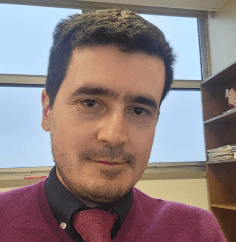
The Victoria Hospital, London, was awarded a $14,029 Research Grant in 2017 to study a new staging system for IPF.
The study, conducted by Dr. Marco Mura and 6 other researchers, involved 123 patients with IPF and investigated the relationship between disease progression determined by high resolution CT scan (HRCT) and functional decline in IPF. It sought to confirm that a simple HRCT fibrosis visual score is a reliable predictor of mortality in IPF, when conducted regularly over time, and to determine which pulmonary function tests best reflect survival rates similar to the HRCT results.
“Overall, the study results were relatively as expected”, said Dr. Mura. “Patients showing an increase of more than seven per cent in lung fibrosis over the study period, on average, had a higher chance of dying. During the 3 years, 43 patients died and 11 underwent a lung transplant. Both an HRCT showing a progression of fibrosis and a decline in FVC predicted survival independently and significantly.”
What do the results mean for patients and physicians? “It appears best to use both HRCT and FVC to assess disease progression in IPF,” explains Dr. Mura. “These are accessible and relatively affordable tools that can be used to make changes to treatment and refer patients to a transplant waiting list. However, concerningly, accuracy for predicting survival is still only at about 61 to 66 per cent using a combination of both measurements, meaning that we still need to do better, adding other affordable tools such the six-minute walk test to our evaluation.”
The study reinforced that HRCT is a fairly reliable tool and is one part of a broader investigation into ways to improve the determination of disease progression in IPF.

.
The St Paul’s Hospital, Vancouver, was awarded a $19,490 Research Grant in 2017 for research into physical activity predictors in fibrotic lung disease.

.
The St Joseph’s Hospital Foundation was awarded a $2,500 research grant in 2017 for general research.
.


